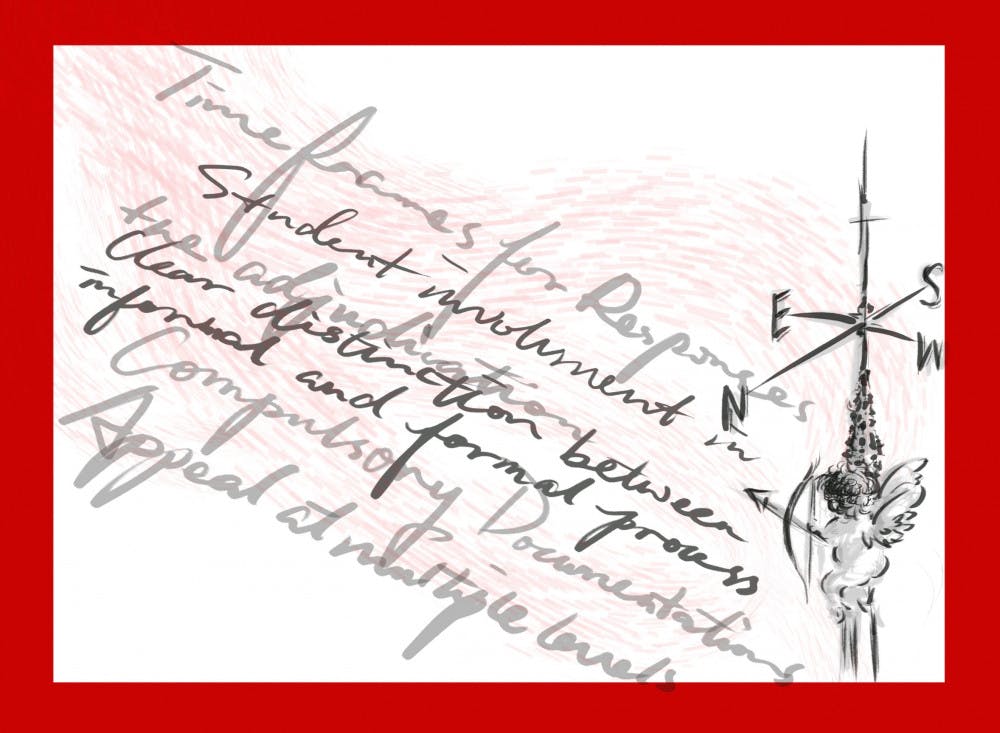The Graduate School updated its academic grievance procedures last fall for the first time since 1973.
The updated procedures establish timeline and documentation requirements, allow graduate students to participate in proceedings, provide multiple opportunities for appeals and create a clearer distinction between formal and informal grievance procedures.
Academic grievance procedures are used to mediate problems and cases that do not fall under the purview of other University processes, such as the Title IX process or the Discrimination and Harassment Policy Incident Reporting Process.
“My colleagues and I in the Graduate School, together with administrators in other offices, had found certain sections (of the grievance procedures) unclear,” Associate Dean of Academic Affairs Thomas Lewis wrote in an email to The Herald. “The Graduate Student Council had also expressed that some graduate students found the procedures unclear and asked that it be updated.”
GSC President Alastair Tulloch GS also cited concerns about the efficacy of the old procedures. The GSC “had heard from people who had navigated the old procedures that it would go on and on and on,” he said.
In addition, the length of procedures could delay “the careers and the lives of graduate students if they had to navigate (these) before moving through their graduate program,” Tulloch said.
A working group of four graduate students and four faculty members met several times over the summer to draft the new rules. The group reviewed academic grievance procedures at other universities, such as New York University and the University of California, Berkeley, said Brittany Baxter GS, a member of the working group. Lewis then presented the draft at the second GSC meeting of the fall semester and asked graduate students for their feedback, much of which was later incorporated into the procedures, The Herald previously reported.
Compared to the procedures of other universities, “so much of our wording was vague, along the lines of ‘as expeditiously as possible,’” Baxter said.
The update also gives graduate students more of a voice in the procedures, as there will now be a place for a graduate student on each committee that hears academic grievance cases. These students’ voices “will be weighed just as other members’ voices are,” Lewis wrote, “unless the matter involves the evaluation of the quality of academic work,” or a student “prefers not to release the relevant academic records.”
The graduate students in the working group “thought it was important to have the graduate student body more involved in these kinds of processes, but understood that required great responsibility and confidentiality,” Baxter said.
Clarifying the distinction between formal and informal resolution processes was also key, Lewis said. “It is important that everyone understand(s) when the formal procedures are being invoked and need to be followed.”
Under the old grievance procedures, graduate students were required to first attempt to resolve complaints informally with the other person or people involved, Tulloch said. As graduate students often work closely with their advisors, Tulloch added, an initial informal approach, even about the department as a whole, could leave students in fear of retaliation from their advisors or the directors of their programs.
As a result, the new procedures “stress that the informal procedures are only optional,” Tulloch said.
Baxter also noted that these changes are long-overdue initial steps, which are open to future improvement and amendment.
Since Lewis became a dean of the Graduate School in 2016, “the grievance procedure has, as far as I know been used very rarely,” he wrote. “I do not yet know whether the new procedure will now be used more frequently.”
Moving forward, “we’re waiting to address whatever feedback may come up” regarding the new procedures, Tulloch said.





